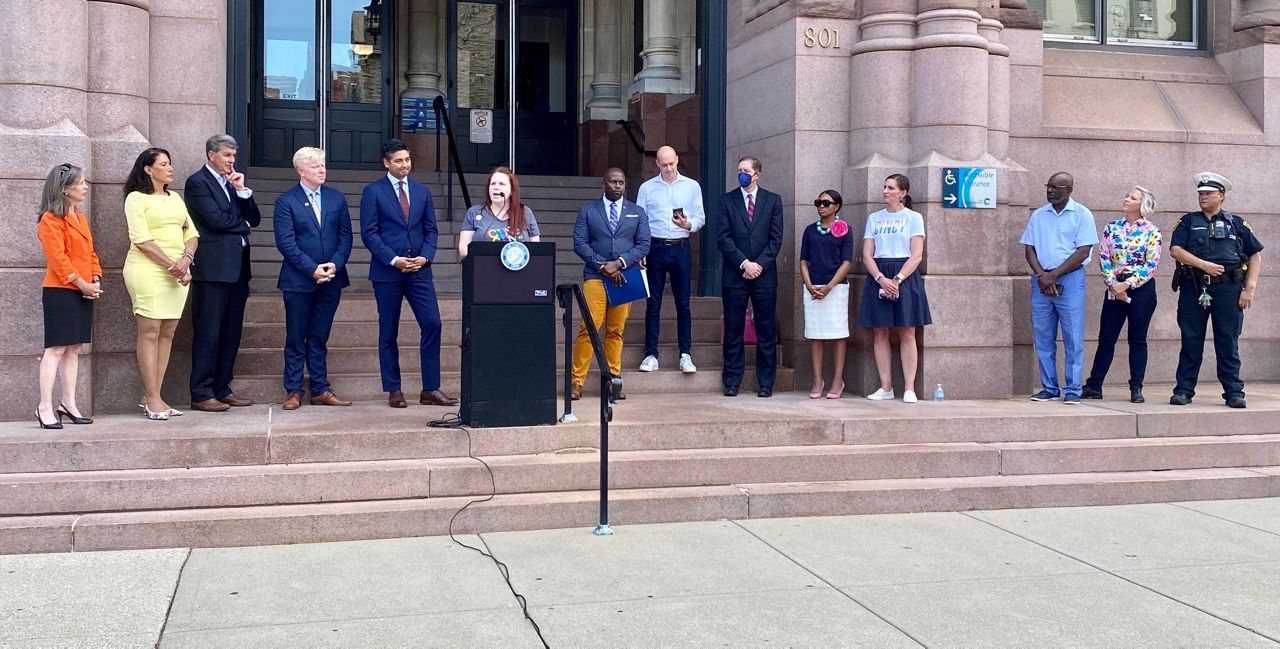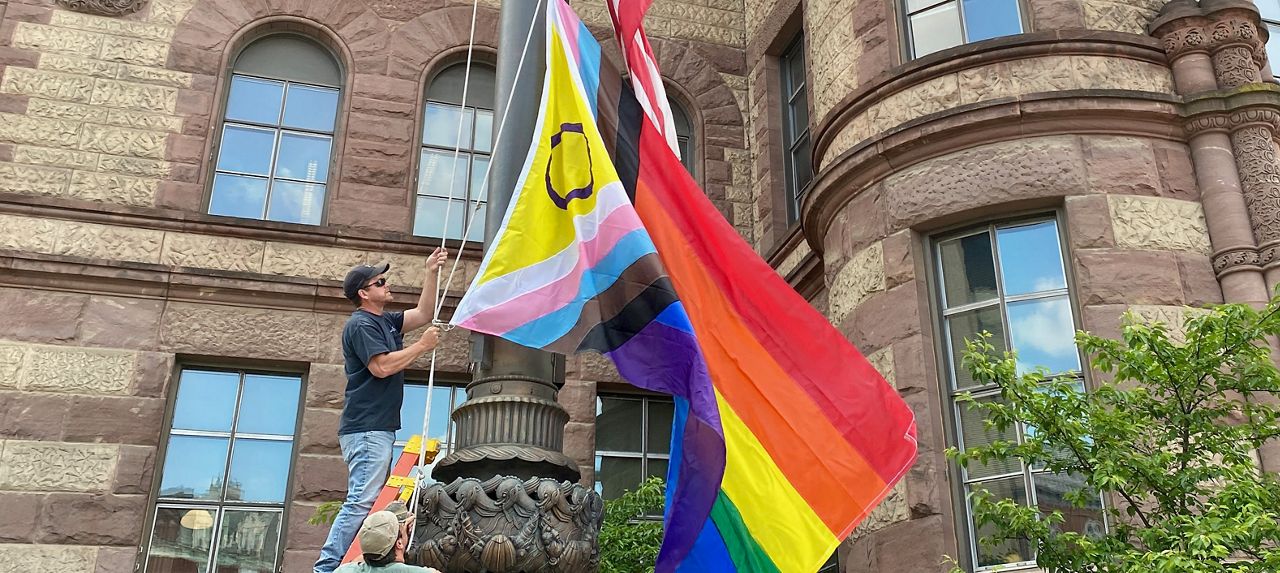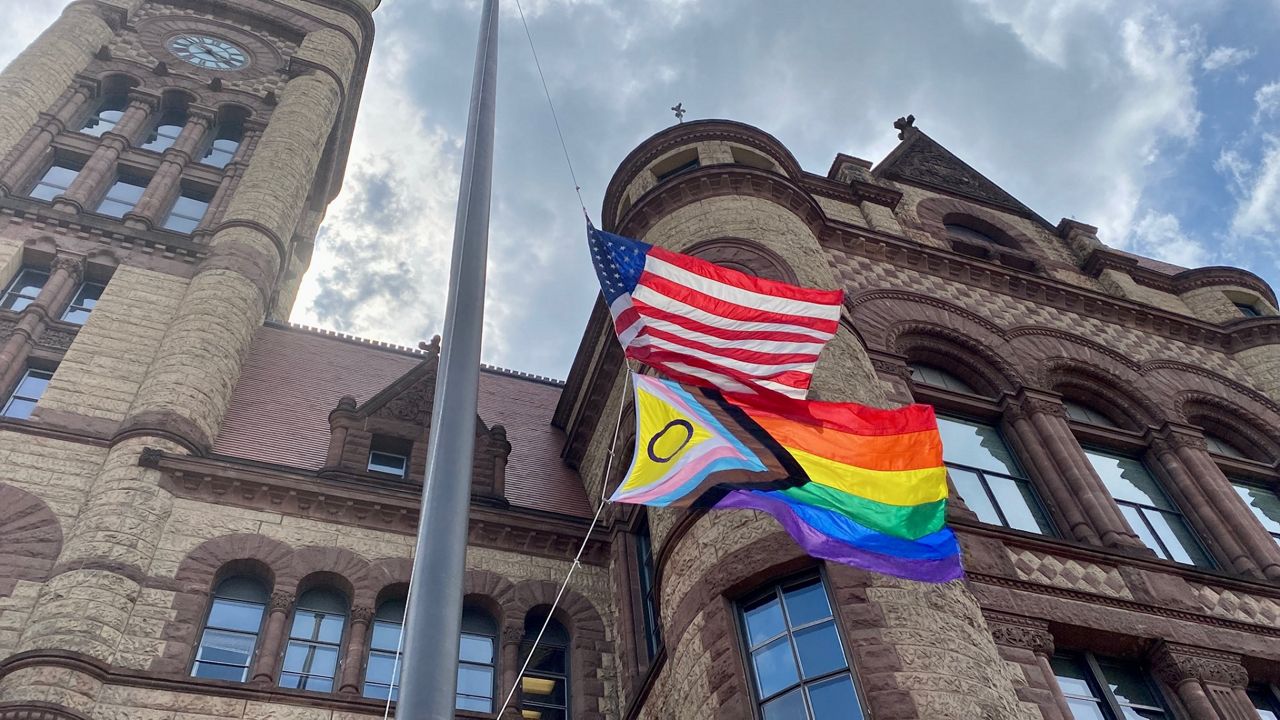CINCINNATI — City officials joined members of the local LGBTQ+ community at City Hall Plaza Wednesday afternoon to once again raise a flag in honor of Pride Month.
What You Need To Know
- Cincinnati hoisted a Pride flag at City Hall for the fourth year in a row to kick off Pride Month
- The design of this year's flag is even more inclusive of other groups, including intersex people
- Despite progress, some feel pending legislation threatens the rights of LGBTQ+ people in Ohio
- Cincinnati Pride is June 25
For the fourth year in a row, the City of Cincinnati raised the flag over the top government building in the Queen City. Event organizers either canceled or scaled back Pride events each of the past two years because of the ongoing pandemic.
But this year, dozens of residents and city employees flocked to the plaza sandwiched between Eighth and Ninth streets in downtown Cincinnati to take part in an afternoon celebration.

Following the flag raising, a block party featuring a DJ and food trucks took place on the street outside City Hall. Several members of City Council and the mayor attended.
“We are a city; we are a people who stand for mutual love and acceptance of all,” said Mayor Aftab Pureval. “No matter who you love, no matter what your identity or your expression is, in Cincinnati and Hamilton County, we embrace you, we see you are beautiful exactly the way you are, and we are with you in the work to defend your rights and celebrate your truth.”
Pride Month takes place in June every year in honor of the 1969 Stonewall Uprising in Manhattan, N.Y., a defining moment for gay rights in the United States. Public LGBTQ+ events have been happening in Cincinnati, in some capacity, dating back to 1973.
But the month of June is double significant to freshman Council member Reggie Harris, who is an openly gay Black man.
Each June 19 is the celebration of Juneteenth, which commemorates of the ending of slavery. It’s another holiday that has grown in prominence locally in recent years.
City of Cincinnati employees donated this year’s flag—a “more inclusive” design featuring the traditional rainbow colors as well as imagery designed to show support for other groups within the community, including people of color, transgender people and intersex people.
“This month is a reaffirmation and a commitment to making sure Cincinnati is the most progressive city in the state of Ohio,” Harris said, adding that he sees the city as becoming a model for revitalization without displacement.
Michael Chanak Jr. has lived in Cincinnati since the spring of 1978 when he moved from northeast Ohio for a job in Cincinnati that eventually led him to work at Procter & Gamble. Until recently, he said he “couldn’t have imagined” he’d ever see a day when the Pride flag flew over City Hall.
In the late ‘70s and 1980s, being an openly gay or queer person was difficult, he said. There was no internet and there weren’t many mainstream hangouts. He found his first local safe haven, Golden Lions Lounge—a since-closed historic gay bar on Ludlow Avenue in Clifton—by luck.

Beyond that, it just wasn’t safe to express yourself, Chanak Jr. said. He recalls colleagues being worried for him, professionally and personally, after a video clip of him kissing another man at the 1986 Cincinnati Pride festival made its way onto a local news station.
“It’s a matter of pride and a feeling it was worth the risk to be out there — not just me, but so many folks whose names you’ll unfortunately never know,” he said. “It takes so many people to make things like this happen. And it takes a long time to make it happen, but it’s worth it.”
Chanak Jr. planned to spend June 1 celebrating with dear friends, members of the LGBTQ+ community and allies. But he admitted the day shouldn’t all be about fun and frivolity.
He sees some members of the Ohio General Assembly as on the “attack,” as he called it, against people in the LGBTQ community, particularly those who are transgender. He cited two bills working their way through the Ohio Statehouse—House Bill 454 (“Safe Act”) and House BIll 616—as examples.
“People like to say, ‘Oh, Michael, the bad old days are gone. But you know, with some of the things taking place in Columbus and Washington, D.C., I’m not so sure,” he said. “I think it’s important to celebrate, but it’s also important to remember the struggle isn’t over. It’s never over.”
Jen Scott, chair of Cincinnati Pride, said that while proclamations, flag raisings and celebrations are an important part of “visibility and acceptance,” she described them as “mere gestures” while the “rights of the LGBTQ community are up for debate.”
“How can we celebrate with bright colors, parades and festivals when our community is facing these numerous challenges?” she asked.
Scott praised Cincinnati City Council for recently voting to update its nondiscrimination policies to be more exclusive and in the absence of state and federal protections, protecting individuals from discrimination based on sexual orientation, gender identity or expression.
This year’s Cincinnati Pride parade and festival is Saturday, June 25. Scott views it as a chance to protest against the legislation in Columbus and an opportunity to call on the rest of Ohio to follow Cincinnati’s lead.



